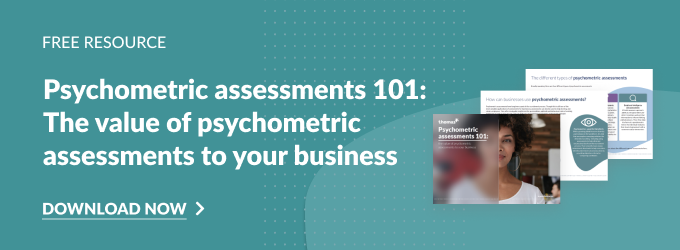As more and more businesses learn about the benefits of psychometric tests, this method of assessment is becoming part-and-parcel of the recruitment process. It’s easy to understand why.
By conducting psychometric assessments at the candidate selection stage, we can identify so much more about a person. This includes their behaviours, values and intelligence levels – which are all key to determining whether someone would be a good fit for a job or company. Psychometric tests cover both aptitude and personality and delve into areas such as emotional intelligence and communication styles.
We’ve assembled this guide to introduce you to, and help you understand, the different types of psychometric tests available.
At Thomas, we offer a range of psychometric assessment tools designed to help you hire more confidently and accurately, providing you with insightful sources of data that traditional interview methods can’t provide on their own. If you’re keen to build a more reliable and engaged workforce, keep reading to find out more.
What are the different types of psychometric tests?
Psychometric assessment tools are suited to different purposes and outcomes, and we can work with you to identify which tests will be right for your organisation. Of all the traits psychometric tests evaluate, there are four main groupings or categories: aptitude, behaviours, personality and emotional intelligence.
While aptitude measures cognitive abilities, behaviour testing will look at how a candidate acts or communicates. Personality testing explores candidate traits and how they might fit with a particular role whereas E.I., or emotional intelligence, can be measured through its own set of tests. Here’s a more detailed breakdown of the different types of psychometric tests available.
Psychometric aptitude testing
Psychometric aptitude tests are used to measure a candidate’s cognitive abilities. With these types of tests, there’s usually a minimum score, which will help to determine intelligence levels in an individual. Let’s take a look at the different types of aptitude tests available:
- Numerical - As the name suggests, numerical psychometric tests will explore how quickly and easily a candidate works with numbers.
- Verbal - Verbal psychometric tests will explore a candidate’s understanding and comprehension skills with written extracts, usually with a multiple-choice answer format.
- Inductive - This type of psychometric tool will measure the candidate’s ability to think methodically, usually using graphic sequences.
- Diagrammatic - These types of tests will explore a candidate’s ability to problem-solve. Typically, candidates will get about one minute to answer each question.
- Logical - Just like you’d imagine, these tests are designed to measure an individual’s ability to think logically. These tests are similar to diagrammatic testing, but may not use diagrams.
- Error checking - This one’s also reasonably self-explanatory, gauging how a candidate identifies errors within information.
Behaviour testing
By assessing and understanding a candidate’s behavioural style, we can explore things such as their preferred way of communicating, how they might handle setbacks, or how they would approach managing a team.
This kind of insight is crucial in identifying development areas, maximising engagement and establishing whether an individual would be a good cultural fit for a team or organisation.
One example of behavioural tests is Thomas’ Personal Profile Analysis (PPA) which is rooted in William Moulton Marston’s DISC theory uses four main profile factors: Dominance, Influence, Steadiness and Compliance to provide information on an assessment taker’s fears, motivators, values and behavioural style.
In order to complete the PPA, candidates choose two trait adjectives from a block of four, one 'most like' and one ‘least like’ them. This process is repeated 24 times, giving 48 choices from a total of 96 words. An individual’s response patterns are compared to themselves rather than the scores of a comparison group.

Personality testing
Personality tests (also known as occupational tests) measure a candidate’s suitability for a role by exploring interests, values and behaviours.
One example of a workplace personality assessment is Thomas’ High Potential Trait Indicator (HPTI) that provides insight into how individuals approach their work and whether their strengths may become their derailers. Specifically, it can help identify leadership potential by exploring a person’s personality traits.
The Thomas HPTI is a self-report questionnaire where candidates are asked to indicate their level of agreement on a 1-7 Likert scale (1 ‘disagree completely’ to 7 ‘agree completely) across 78 questions.
The benefits of personality testing are similar to those of behavioural tests and will help determine how well an individual will integrate within a team or company.
Emotional intelligence testing
A person who is highly emotionally intelligent will be much better equipped to recognise their emotions and those of their peers. They are also able to use that information to inform thinking and behaviours. By testing emotional intelligence in candidates, we can identify how effectively they can communicate with others in the workplace.
One example of emotional intelligence testing would be the Trait Emotional Intelligence Questionnaire – also known as the TEIQue. This test of more than 150 questions explores 15 different traits in a candidate, including sociability, self-control and wellbeing. Similarly, the Emotional Intelligence Questionnaire (or EIQ), will review a candidate’s attitude to the likes of influencing, integrity and intuition.
As with behaviour and personality testing, evaluating a candidate's level of emotional intelligence can help establish if there will be a strong culture fit. The results may also indicate whether a particular candidate shows the potential to lead, as emotional intelligence plays a key role in effective management and leadership.
Find out more about Thomas' psychometric assessment tools
By using psychometric tests alongside your usual recruitment methods, you’ll be working with a much more robust and accurate selection process.
At Thomas, our mission is to get to the bottom of your organisation’s needs and establish a framework of tools that will help you hire the right people for the job. Our psychometric testing tools encompass all of the methodologies above.
Contact us today to find out more about the types of psychometric assessments we can offer your business.




